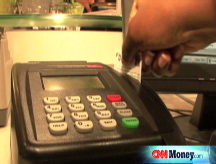Why you just can't seem to save enough
Most of us don't like to do math. Fewer of us like to budget. If we're on our way to a recession then, why do we keep spending?
 |
| Pat Regnier's column "The Bottom line," appears monthly in Money Magazine. Email him at pregnier@moneymail.com |
| MMA | 0.69% |
| $10K MMA | 0.42% |
| 6 month CD | 0.94% |
| 1 yr CD | 1.49% |
| 5 yr CD | 1.93% |
(Money Magazine) -- Your mortgage is prime. Your credit-card balance is reasonable. You've set aside some money for retirement. Feeling like you've done all you should? Didn't think so.
All signs point to an economic slowdown, and there's a real risk that it will be a nasty one. Jobs look shaky, food and gas prices are up, and the credit you thought would be there in an emergency could get a lot more expensive.
Even if you've been better than the average American about saving, you probably wish that you had a bigger cash cushion right now. And if you're at all like me, you've been looking around your house lately and wondering, "Why didn't I put the money I spent on that in the bank?"
Seriously, there are shirts in my closet that would make Daisy Buchanan weep...and I get misty too when I think of the cash I wasted on them. What can I say? I bought them during the booming '90s when I covered Wall Street, where even the bit players dressed like minor British royals. I knew other reporters - reporters - who had their shirts custom-made. My off-the-rack extravagances seemed sensible by comparison.
In short, I got caught up in a kind of consumer mob. It's no secret that our spending habits are driven in part by the crowd we're in. But there's more going on here than envy and status seeking. Most of us don't like doing math, and even fewer enjoy keeping a budget. When deciding whether a big expense is reasonable or not, we often take mental shortcuts. One of the easiest is to look at what people we know are doing.
That's trouble because we're almost certain to draw the wrong conclusions, says Ronald Wilcox of the University of Virginia business school. His new book, "Whatever Happened to Thrift?", is a surprisingly witty guide to a gloomy subject: the complete inability of the world's richest nation to save.
A big part of the problem, Wilcox says, is that our shortcut-loving brains trick us. "We tend to remember extraordinary consumption more than mundane consumption," he notes. Wilcox says this is an example of what research psychologist Thomas Gilovich calls a one-sided event.
There's little reason to notice that most of your neighbors drive Accords. It's a good car, but who daydreams about owning one? When a single family on your block buys a Lexus, however, it suddenly feels as though everybody has one.
Our friends play tricks on us too. "We tell people about it when we go out to eat at a nice restaurant," says Wilcox. "We don't convey the same information when we eat mac and cheese at home." As a result, you likely have a skewed view of your friends' standard of living.
Now add to this that incomes in America have grown increasingly unequal. A few folks you know (and most of those you see in the media) really are doing better than you are, and that distorts your view even more. Wilcox calls the end result "perceived consumption superdisparity." It'll leave you superbroke if you aren't careful.
I asked Mary Claire Allvine, a financial planner in Chicago, if she had any tips for breaking free of PCS affliction. Cutting back on every little extravagance, like your morning tall skinny latte, won't get you very far, she says. And it's hard to sustain.
Better to simplify the problem. Instead of limiting your spending so you can save what's left, decide first what you'll save and learn to live on the rest. And get it out of your hands as fast as you can. Signing up for automatic withdrawals, through a 401(k) at work or in a taxable mutual fund account, will help you a lot.
Allvine offers more unconventional advice: If high-living pals are a problem for you, find some new ones. That doesn't mean you have to cut off the big spenders. Just widen your social circle. Take up a volunteer activity or a cheap hobby where the accent isn't on consumption. Forget the country club. Join the "Y" or, better yet, an investing group with a long-term focus.
And avoid reporters in custom shirts. They'll probably hit you up for a loan.
Send feedback to Money Magazine ![]()




